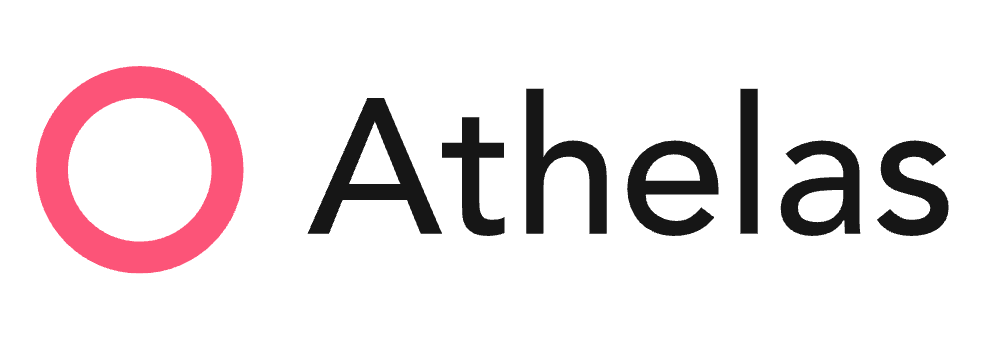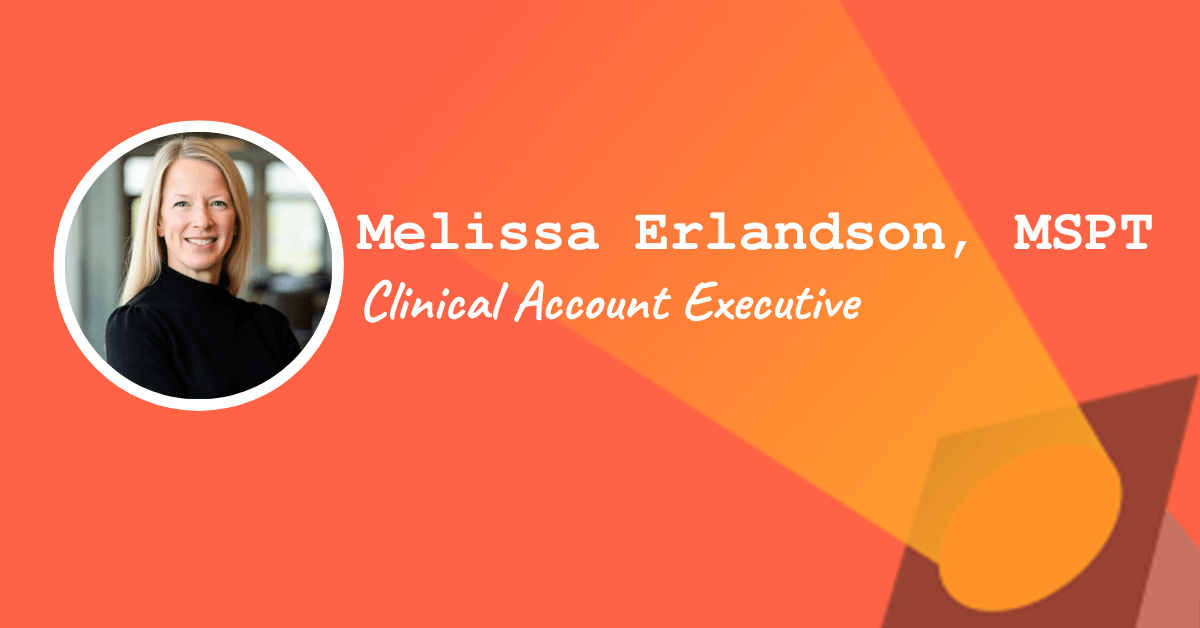This week’s spotlight is on Melissa Erlandson, MSPT, a non-clinical physical therapist who is now Clinical Account Executive for Athelas! This is Melissa’s second spotlight, and we’re so excited to see her non-clinical career growth!
This post may contain affiliate links or codes. This won’t increase your cost, but it helps keep TNCPT alive, and free of annoying ads! Thank you for your support. 🙂
What is your full name, title, and company name for your current, primary role?
Melissa Erlandson, MSPT — Clinical Account Executive for Athelas

Where are you located?
Minneapolis, MN.
Where did you go to PT school, and what year did you graduate?
University of Minnesota-Twin Cities, 2001.
Please refrain from contacting our spotlight participants on social media. There are thousands of readers just like you out there. 🙂 Please ask your questions in the comments on this blog post.
If you’re a Non-Clinical 101 student, you can network with many of our spotlight participants in the alumni groups!
What did you do when you first finished school, and for how long?
In my first year after PT school, I worked in outpatient private practice in general orthopedics.
In what setting(s) did you work, and what types of patients did you treat?
I worked in outpatient orthopedics at the beginning and end of my direct patient care career. In between, I worked in pediatrics and geriatrics while raising my three children.
What did you enjoy about your early roles? What didn’t you enjoy?
I very much loved getting to know and working with my patients and families to empower them to achieve their optimal function. It is the number one thing I miss about direct patient care.
What else have you done since then, prior to your current role?
I left direct patient care after 16 years. I worked in UM physical health/medical benefits management. From there, I went into a Six Sigma Black Belt Process Improvement role and most recently was in network development for the mobile outpatient platform Luna Physical Therapy.
Editor’s note: Check out Melissa’s previous spotlight as Network Development Specialist for Luna Physical Therapy!
When and why did you decide to do something non-clinical?
My last patient care role was moving toward less flexibility and autonomy. At the same time, I was being headhunted by the Optum Utilization Management team for my varied clinical experience, which included women’s health.
I didn’t consider the role until a good friend of mine in talent management convinced me I was making a mistake by not at least exploring the opportunity. I ultimately decided to take the position to provide greater flexibility for my family, career growth and to raise awareness for women’s health.
What are you doing these days?
I just started a new role in field sales as a clinical account executive at Commure Athelas. I advise physical therapy and medical practices on AI-enabled tools to streamline workflows, increase revenue and save LOTS of time!
I am happy to be able to give providers and practices the ability to fight fire with fire against insurance companies and get their focus back on what we love, patient care.
Editor’s note: Want to learn more about the role of artificial intelligence in rehab therapy? Check out our series on AI for Rehab Professionals!
Are you still treating patients, or are you solely non-clinical?
I am solely non-clinical.
How long have you been in your current role?
Since January 2025.
Did you get any special certifications or training along the way to help you get into your current role?
No certifications are needed for this role.
How did you find your job? Did you apply or find it through a connection?
I saw it in my LinkedIn feed—an opening posted by my current leader.
What was the interview like for the clinical account executive role?
I had four interviews at Athelas. They asked me about my background and what interests me about healthtech software sales.
How have people reacted to you leaving patient care?
When I first left patient care in 2016, I had colleagues that were disappointed and questioning my decision. I think the landscape is so different now compared to eight or nine years ago.
Now, so many of us have lost the ability to feel healthy, mentally and physically, operating in such a broken system. I wanted to get on the other side of things and sincerely try to make it better, even if in small ways.
What’s a typical day or week in the life like for you? What types of tasks and responsibilities fill your time?
Field sales is not easy. I expect it will be a hustle and a grind with the ability to be rewarded accordingly. I would suggest interviewing other people in field sales before making the switch. My husband was in field sales for 13 years, so I went in with eyes wide open.
What are some of the rewards of your role? What are the biggest challenges?
The rewards lie in empowering practices and providers to gain an advantage over insurance companies, allowing them to retain more of the income they’ve earned and redirect their focus to what truly matters.
The challenges, as with any new technology—especially AI—lie in educating people about its capabilities and helping them embrace its potential. Change can be intimidating, and new innovations often bring a sense of uncertainty.
How did your clinical background prepare you for this role? Which skills transferred?
I would argue that building a strong network, along with your experience as a clinician, is incredibly valuable in any healthcare-related sales role.
Having firsthand experience treating patients in today’s complex healthcare landscape sets you apart from those who lack that perspective.
It allows you to genuinely relate to providers, understand their challenges, and offer insights on how to improve their work lives—insights that come from having lived through it yourself.
Ready to launch your own non-clinical career?
Roughly speaking, how are the hours and pay compared to patient care?
Generally speaking, in most sales roles, the effort you invest directly correlates with the rewards you reap. Long hours often lead to greater compensation, but this is not always true in the clinic setting. In many cases, putting in more hours does not necessarily result in higher pay.
What type of person do you think would do well in your clinical account executive role?
A go-getter, hard worker, and someone who is not afraid of the word “no.”
Do you work remotely or onsite?
Does your organization hire PT, OT, or SLP professionals into non-clinical roles? If so, what type of roles?
Yes, Commure Athelas hires all types of clinicians for clinical sales.
Did you read any books, take any courses, or do anything special overall to get you where you are today?
This is a hard question to answer because I can’t think of one book or course in particular. However, I have had a general curiosity and drive to discover and understand new things. I would say always be curious and ask a lot of questions.
What is a typical career path for someone in your clinical account executive role?
I don’t believe there’s a single, defined path to this role.
You can jump straight into field sales without any non-clinical experience, which can make it an attractive option for clinicians looking to transition into a non-clinical career.
What is next for you? What are your high-level career aspirations?
Great question! I think my next aspiration is retirement! 🙂
What would you recommend to someone who is considering going into a role like yours? Do you have any special words of wisdom for the readers?
Do your research and ask the hard questions to make sure it is a good fit.
What would you like to change most in your profession, and why? How would you propose doing so?
If I could wave a magic wand for our physical therapy profession, I would increase reimbursement rates for therapy services to ease the pressure and stress caused by high productivity standards. This would help foster a healthy pipeline of quality PTs, ensuring that more professionals continue to choose physical therapy as their career. At the current rate, we’re losing PTs and clinicians across the board, which only contributes to clinician burnout.
What career advice would you give yourself that you wish you had during school?
The advice I wish I had was just because you have a degree in physical therapy does not mean you are obligated to practice physical therapy for the rest of your career.
The world has so many great opportunities that you are completely qualified for.
What would you teach to today’s graduate students in your profession, if you had the opportunity?
I would teach personal finance, specifically what is the ROI on your educational investment and are you prepared for the reality of paying back your student loans on a limited income.
Do you have any special advice for others who want to follow in your footsteps?
My advice would be to gain as much clarity as possible about your goals, so your network can support and guide you toward your desired outcome. Then, focus on taking consistent, purposeful steps forward. Over time, those small efforts will accumulate and open doors to new opportunities.





